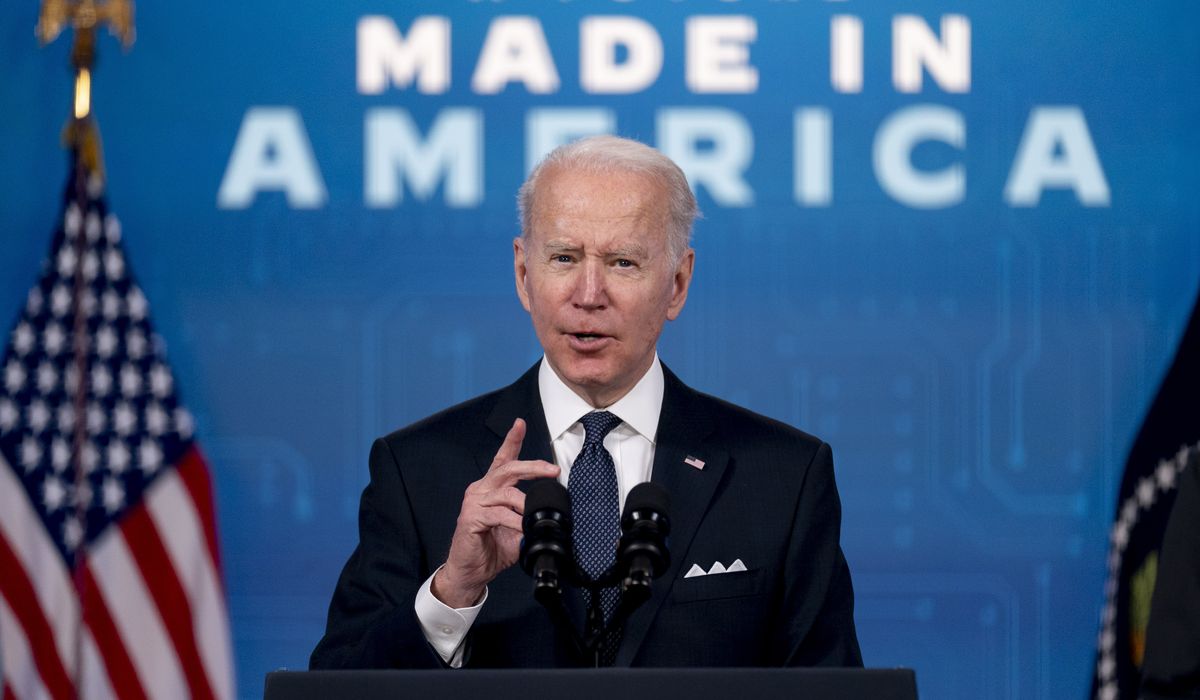
President Biden on Friday urged Congress to pass legislation that would spend billions to increase U.S. semiconductor production, saying America needs to end its reliance on foreign computer chips.
At a White House event touting Intel Corp’s construction of a $20 billion chip manufacturing complex outside of Columbus, Ohio, Mr. Biden urged lawmakers to “get another historic piece of bipartisan legislation done.”
“Let’s do it for the sake of our economic competitiveness and our national security,” the president said. “Let’s do it for the cities and towns all across America working to get their piece of the global economic package.”
The legislation, known as the CHIPS for America Act, would spend $52 billion to increase U.S. semiconductor chip production. It passed the Senate in July with bipartisan support but has stalled in the House.
Under the legislation, the federal government would fund domestic semiconductor research, design and manufacturing by private companies. It would also offer other incentives like tax breaks for companies that build new chip manufacturing plants.
The chips power everything from toothbrushes and coffee machines to cars and iPhones. A global chip shortage has contributed to soaring inflation and skyrocketing car prices.
Mr. Biden said the legislation would help make the U.S. supply chain more resistant to disruptions. The supply-chain crisis has hamstrung the U.S.’s economic recovery after the COVID-19 shutdown.
But critics say the legislation won’t do much to address the chip shortage that is impacting the U.S. economy, because of the length of time required to get a chip factory online.
The factory in Ohio is expected to create 7,000 construction jobs and 3,000 permanent jobs.
Intel’s new plant, which Mr. Biden hailed as “a historic investment,” won’t be running until 2025.
When asked how the plant would alleviate the chip shortage when it’s three years away from coming online, White House press secretary Jen Psaki said it could prevent future shortages.
“I think our view is that it is an important step forward to ensure that we have manufacturing capacity here in the United States so that we don’t have a chip shortage in the future,” she said.
Ms. Psaki also declined to speculate why the legislation has stalled in the Democratic-controlled House.
“I think [House] Speaker [Nancy] Pelosi made it clear she wants to move it forward,” she said.
Even if the U.S. increases production significantly, it can’t completely remove itself from the global supply chain. The testing and packaging are completed in Southeast Asia, where costs are much lower.
It costs 30% more to make a chip in the U.S. than in Asia, according to a 2020 report by the Semiconductor Industry Association. That could add $10 billion to $40 billion to production expenses.
Intel Corp. announced last month that it will spend $7.1 billion to build a massive packaging and testing facility in Malaysia, bucking the administration’s call for more domestic manufacturing.
The $7.1 billion is part of Intel’s overall $30 billion spending on facilities in Malaysia, which will include a sprawling complex to build chips for cars, computers and other industries.
In China, where it costs nearly 50% less to produce a semiconductor than it does in the U.S., the government is spending $150 billion to increase chip production. That is nearly triple the level of spending under the CHIPS Act.
Still, Mr. Biden argued that the legislation is necessary for the U.S. to compete with China.
“China is doing everything it can to take over the global market,” he said.
Some fear the bid to increase manufacturing in the U.S. will lead to a glut of chips in the market, resulting in falling prices and negative or zero revenue growth.
The revenue of the top 10 semiconductor firms, including Intel and Samsung, declined by 12% in 2019 because of oversupply, according to research from Gartner, a technology and consulting company.
The potential for overcapacity is on the horizon as automobile and smartphone makers slash inventory because of sluggish sales.




